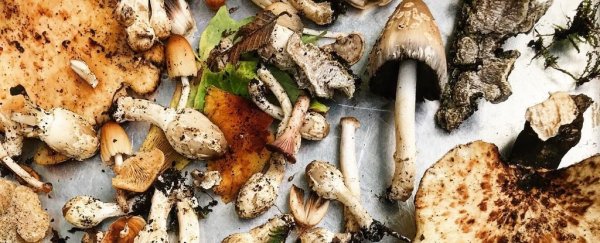We forget that there is magic in food, the cookbook says. But this is no mere cookbook: "It's a retreat to nature, an invitation to escape to another realm".
It's also something else: recalled. Food blogger and natural lifestyle influencer Johnna Holmgren has had her first cookbook pulled from shelves after readers warned its recipes contained potentially toxic and dangerous ingredients that could make people sick.
Holmgren – aka foxmeetsbear – has notched up 132,000 followers on Instagram thanks to a craftily curated stream of woodsy, idyllic utopianism. Food is foraged. Children are nurtured. Her husband is a chalk artist. You get the idea.
It's all impeccably beautiful – and exquisitely photographed – much like her book itself: Tales From A Forager's Kitchen. But it's not the imagery that's the problem – rather the words, due to the ill-advised ingredients Holmgren insists we should all be plucking and eating.
At time of writing, 47 percent of reviews on Amazon give Tales From A Forager's Kitchen a 1-star rating, with dozens of people denouncing the book's "misinformation" about foraging practices, which they say is unsafe, under-researched, and irresponsible.
One of the chief targets of criticism is a recipe for "Dark Chocolate Dipped Fungi" which advocates using raw morel mushrooms. According to experts, that's not a great idea.
"As a general rule, no wild mushrooms should be eaten raw," Richard Pizarro of the Minnesota Mycological Society told BuzzFeed News.
"Your digestive tract will not be happy."
One of the reasons for that is because wild mushrooms can be poisonous, but even the edible ones can harbor other harmful debris inside them, and they also contain a substance called chitin that's hard for our bodies to break down.
"This is a very difficult material for our bodies to digest and may cause noticeable discomfort," Pizarro says.
"Cooking the morels breaks down the chitin and makes the mushroom more easily digestible."
Perhaps most dangerously, it's hard for fledgling foragers to tell real morel mushrooms from so-called 'false morels', which can cause confusion, delirium, seizures, and even coma.
Other recipes coming under fire in the book include a smoothie recipe that calls for raw elderberries (which can be poisonous and cause severe stomach upsets), and a pumpkin soup recipe that uses raw acorns (not soaked, which is needed to leach out the bitter and potentially irritating tannins).
"Eating enough tannin will upset your stomach," the founder of Berkeley Open Source Food, Philip Stark, suggested to BuzzFeed, "but I think it would be hard to do, because it tastes pretty harsh."
Elsewhere, Amazon reviewers lament other kinds of errors throughout the cookbook, including an 'inedible' French Toast recipe that suggests soaking, but not cooking, wild rice.
"Serious safety warnings… criminally bad, irresponsible advice," reviewer Wild Explorations sums up. "This book is a lawsuit waiting to happen."
Perhaps to head off that eventuality, publisher Rodale Books have now pulled the plug on Tales From A Forager's Kitchen, announcing an immediate recall of the controversial cookbook on Friday.
"Rodale Books and our author Johnna Holmgren take very seriously the concerns expressed by readers regarding the preparation and cooking of recipes with raw ingredients," a statement explains.
"In light of our review of these concerns, and because of our dedication to wellness, Rodale Books and Johnna Holmgren have decided to discontinue the publication and promotion of the book."
Before the recall, Holmgren had defended the book, saying it was for "adventurous eaters" and explaining she'd never had any negative experiences consuming raw mushrooms, nor adverse reactions eating raw elderberries.
In Holmgren's defense, both the book and her website convey warnings about the potential dangers of eating the wrong kinds of foraged foods.
"Some species will simply give you an upset stomach," her book advises, "but others, especially in the fungi world, can be so dangerous and their potency so strong that it may lead to death."
But these advisories also pass the buck, putting the onus of not poisoning yourself very much on the buyer of the book.
"While I strive to be 100 percent accurate, it is solely up to the reader to ensure proper plant identification," a disclaimer on her website reads.
"Some wild plants are poisonous or can have serious adverse health effects. I am not a health professional, medical doctor, nor a nutritionist."
As it turns out, not being a cookbook author can sadly be added to that list, and all for a very simple reason, as Tara on Amazon puts it succinctly:
"There is a lot of unsafe misinformation in this book as to what is safe to eat or not. These recipes were not well researched or evaluated before printing and could honestly poison you and your family."
